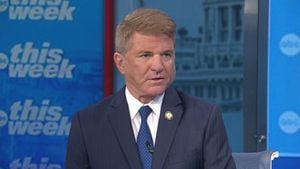CVS Health has found itself at the center of industry turmoil with the abrupt departure of its CEO, Karen Lynch. This shake-up is more than just corporate drama; it reflects the pressing challenges currently plaguing major pharmacy chains. Under Lynch's leadership, CVS saw its shares plummet 19% this year, compounded by disappointing forecasts and rising operational costs.
Taking Lynch's place is David Joyner, a seasoned executive within CVS, who steps up as the company grapples with serious issues. The pressure on Joyner is enormous—he'll need to navigate rising costs within the health insurance segment, stale drug-store sales, and the ever-growing scrutiny from investors. This news aligns with broader trends affecting the entire pharmacy sector, where competition is intensifying thanks to the rise of online options and discount retailers.
Analysts like Michael Cherny from Leerink Partners expressed surprise over the leadership change, citing the company's continuous struggle with performance as the main reason for Lynch's exit. This sentiment echoed across the financial community, with many feeling the shift was overdue. "Given the operational and stock underperformance, it’s hard to argue against the leadership change," Cherny commented.
CVS Health, headquartered in Woonsocket, Rhode Island, is no small player; it's one of the largest drugstore chains and operates vast pharmacy benefit management services. Alongside these roles, it also manages healthcare insurance coverage for nearly 27 million individuals via its Aetna wing. These expansive operations make the recent leadership transition all the more significant.
Earlier this summer, CVS Health had already revised its profit expectations downwards—its third adjustment of the year—primarily due to surging costs associated with its Medicare Advantage plans. Lynch, trying to regain control of the situation, took over operational leadership of the insurance division after her predecessor left. Yet, even these efforts seem insufficient against the backdrop of rising claims and operational challenges.
Meanwhile, the health insurance component remains particularly vulnerable. Industry insiders from Barclays have raised concerns about the existing leadership void within the insurance segment, which only amplifies the challenges Joyner will face. The hedge fund Glenview Capital Management, which possesses significant stakes in CVS, recently aired its grievances, stating the company is operating far below its potential and lacking sufficient investment and planning strategies.
Consequently, CVS has found itself caught between internal management issues and external pressures from the market. The healthcare giant is not only contending with the spiraling costs associated with its operations but is also facing the ramifications of decreased quality ratings within its Medicare plans. Industry analysts are now predicting adjusted earnings for the third quarter to fall significantly short of expectations, with estimates ranging from $1.05 to $1.10 per share—well below what investors had hoped.
CVS isn't alone. Rival chain Walgreens has announced plans to close 1,200 stores—a clear indicator of the struggles across the industry. Both CVS and Walgreens are wrestling with the financial repercussions of their business models as patient care evolves alongside increasing technological demands and competitive pricing pressures.
Shifting focus to another area of concern within the healthcare sector, New York's legislation aimed at reforming wrongful death compensation has also stirred up controversy. The third version of the bill, which seeks to offer more substantial compensation to families of victims of negligence, may carry unintended consequences for the healthcare system. Advocates for the bill argue it is necessary for justice but warn of potential fallout for healthcare providers already under pressure.
This bill would allow families to sue for losses from negligence and is considered one of the broadest of its kind nationwide, alarming many within the medical community. New York already leads the nation for medical liability payouts, with costs totaling over $616 million this year. An analysis from Milliman Inc. predicted the new bill could drive medical liability insurance premiums up by nearly 40%. If enacted, this could push healthcare providers out of the state, particularly affecting rural communities, which are already thin on healthcare access.
Clearly divided views surround this legislation. Proponents see it as necessary to deliver justice to families victimized by malpractice, but detractors warn it could financially incapacitate small hospitals and clinics, potentially leading to closures and compounding the existing healthcare worker shortages.
This situation indicates the complexity facing healthcare leaders as they strive to balance accountability with the sustainability of the healthcare system at large. The New York chapter of the American College of Surgeons has gone on record urging Governor Kathy Hochul to veto the bill, citing concerns over cost increases translating to higher premiums for patients and diminished access to care.
Lawmakers need to find collaborative measures to protect rights and access to quality care for all New Yorkers, stressing the importance of transparency. It's not just about punitive measures but about fostering trust between patients and practitioners—a necessary foundation for patient care.
These changes within healthcare leadership, both at CVS Health and under impending legislative reform, are emblematic of the hurdles healthcare faces today. CEOs and leaders are tasked not only with pivoting their companies but also with ensuring the broader system remains intact as they navigate these complex waters.
David Joyner, now steering CVS, faces the dual challenge of revitalizing the company’s fortunes amid fierce market competition and addressing the internal issues exacerbated by the turbulent management history. Simultaneously, New York’s healthcare system stands at a crossroad with legislative proposals threatening to carve deep scars if mismanaged.
While obstacles abound, the healthcare sector is also ripe for innovation and transformation. It's during such turbulent periods where leaders emerge, prompting stakeholders to collaborate on sustainable solutions. The calling for tomorrow’s leaders is clearer than ever—the need for balance, dialogue, and resilience has never been more imperative as they write the next chapters of this industry's story.



